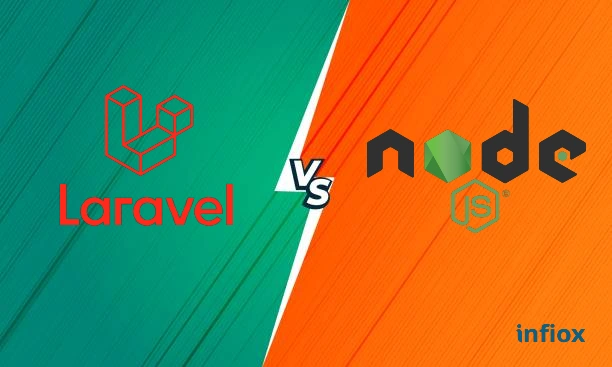In the ever-evolving world of web development, choosing the right backend framework or runtime environment is a critical decision that can shape the trajectory of your project. Among the most popular options today are Node.js and Laravel, two powerful tools with distinct features, advantages, and use cases. The demand for robust, scalable, and efficient backend solutions is higher than ever, making this comparison both relevant and timely.
With countless frameworks and runtime environments available, narrowing down the ideal choice can be challenging. Among the most prominent options are Node.js and Laravel, two backend technologies that have consistently dominated the development landscape. Each offers unique strengths, making them suitable for specific types of projects and development goals.
Node.js, a JavaScript runtime built on Chrome’s V8 engine, is celebrated for its event-driven, non-blocking architecture and real-time capabilities. It’s a go-to solution for scalable and high-performance applications, particularly those requiring real-time data processing or microservices. Laravel, on the other hand, is a PHP-based web framework known for its elegant syntax, robust features, and developer-friendly tools. Its simplicity and versatility make it a favorite for building traditional web development, content management systems, and eCommerce platforms.
Node.js shines in real-time and asynchronous applications, Laravel excels in building traditional web applications with ease and efficiency. The choice between these two largely depends on your project’s requirements, team expertise, and future scalability needs. In this blog, we’ll dive deep into the features, use cases, and performance of Node.js and Laravel, helping you make an informed decision. Whether you’re a startup founder planning your next big project or a seasoned developer exploring new options, this guide will provide valuable insights to choose the right backend technology.
This blog delves into the key aspects of both Node.js and Laravel, comparing their features, use cases, and performance to help you decide which backend technology suits your project best in 2024. Whether you’re planning a large-scale enterprise application, a startup MVP, or a dynamic real-time app, understanding the strengths and limitations of these technologies will guide you toward the right choice.
The Importance of Choosing the Right Backend Technology
The backend serves as the backbone of your application, handling everything from database interactions to server logic and API integrations. Selecting the right technology not only impacts the performance and scalability of your application but also affects development timelines, costs, and future maintenance. Both Node.js and Laravel have proven their mettle in various scenarios, but they cater to different needs, making it essential to understand their strengths and limitations.
Choosing between Laravel and Node.js for backend application development depends on various factors, including project requirements, team expertise, scalability needs, performance considerations, and personal preferences. Here’s a comparison to help you make an informed decision:
An Overview of Laravel : a PHP Framework
Laravel is a powerful and elegant PHP framework designed for building modern web applications. It follows the Model-View-Controller (MVC) architectural pattern, which promotes code organization and separation of concerns. Laravel provides developers with a rich set of features and tools to streamline the development process and create robust, maintainable applications.
Since its inception, Laravel has gained a loyal following among developers for its comprehensive toolset, which includes built-in authentication, routing, and ORM (Eloquent). Its MVC (Model-View-Controller) architecture ensures clear separation of concerns, making the codebase more maintainable and scalable.
Laravel’s expressive syntax and extensive documentation make it an excellent choice for developers looking to build feature-rich web applications efficiently. It also comes with a suite of tools like Artisan CLI, Blade templating engine, and Laravel Forge, making development streamlined and enjoyable. Industries ranging from eCommerce to content management systems have relied on Laravel for its reliability and scalability. As a leading website development company in USA, we focus on clean code architecture, database optimization, and seamless user experiences for laravel development.
Rich Ecosystem:
Laravel has a rich ecosystem with built-in tools and libraries for authentication, routing, caching, and more. It provides artisan command-line tools for automating repetitive tasks and scaffolding application components.
Rapid Development:
Laravel simplifies common tasks like routing, database migrations, and form validation, allowing developers to focus on business logic. It comes with Blade, a powerful templating engine, for creating dynamic and reusable UI components.
Community Support:
Laravel has a large and active community of developers who contribute plugins, extensions, and tutorials. The extensive documentation and community support make it easy to find solutions to common problems.
Key Features of Laravel:
- Expressive Syntax: Laravel offers an expressive syntax that simplifies common web development tasks such as routing, authentication, caching, and database operations.
- Modular Architecture: Laravel’s modular architecture allows developers to create reusable components and extend functionality through packages and libraries. It follows best practices for code organization and encourages developers to write clean, maintainable code.
- Eloquent ORM: Laravel includes an elegant Object-Relational Mapping (ORM) called Eloquent, which simplifies database interactions by allowing developers to work with database records as objects. Eloquent provides a fluent query builder and supports relationships between database tables.
- Built-in Features: Laravel comes with a wide range of built-in features, including authentication, authorization, queuing, event broadcasting, and task scheduling. These features help developers to rapidly prototype and develop feature-rich applications without having to reinvent the wheel.
- Blade Templating Engine: Laravel includes a powerful templating engine called Blade, which provides convenient shortcuts and directives for working with HTML and PHP code. Blade templates are compiled into plain PHP code, resulting in fast performance and efficient rendering.
Cenozic specializes in Laravel, a PHP-based framework renowned for its clean architecture and rich feature set. Our Laravel development services include custom web applications, CMS development, eCommerce platforms development, and API integrations. We utilize Laravel’s elegant syntax, built-in tools, and scalability to craft secure, maintainable, and high-performing applications.
With Laravel, we focus on delivering intuitive user interfaces and seamless workflows, ensuring your application provides an exceptional user experience. Our development process includes database optimization, advanced security measures, and integration with third-party tools to meet the specific demands of your business.
Node.js – JavaScript Runtime:
Node.js, an open-source, cross-platform runtime environment, has revolutionized backend development by enabling developers to use JavaScript on the server side. Built on Chrome’s V8 JavaScript engine, Node.js is known for its event-driven, non-blocking architecture, which ensures high performance and scalability. It’s widely used for building real-time applications, microservices, and APIs, making it a preferred choice for dynamic, high-traffic projects. As a renowned web development company in UAE, we design and develop tailored Node.js applications that align with your business needs. From building real-time chat applications to robust APIs, our team ensures that your application delivers high performance and seamless functionality.
With a rich ecosystem powered by npm (Node Package Manager), Node.js offers thousands of libraries and modules, enabling developers to build robust applications quickly. Companies like Netflix, LinkedIn, and PayPal have leveraged Node.js to create scalable, high-performing solutions, cementing its reputation as a reliable choice for modern web development.
Scalability:
Node.js excels in building real-time applications, APIs, and microservices that require high concurrency and low latency. Its event-driven architecture allows for horizontal scaling and efficient handling of asynchronous operations.
Vibrant Ecosystem:
Node.js has a vibrant ecosystem of modules and packages available through npm (Node Package Manager). Developers can leverage popular frameworks like Express.js for building web applications or Nest.js for scalable and maintainable enterprise applications.
Performance:
Node.js is known for its performance, especially in I/O-bound applications, due to its non-blocking nature and event-driven architecture. It’s well-suited for applications that require handling multiple concurrent connections, such as chat applications or streaming services. At Cenozic, we prioritize performance optimization in every project. For Node.js applications, we ensure real-time responsiveness and efficient resource management.
Key Features of Node.js:
- Asynchronous I/O: Node.js uses an event-driven, non-blocking I/O model, which allows it to handle multiple concurrent connections efficiently. This asynchronous nature makes Node.js well-suited for building real-time applications that require high performance and responsiveness.
- Single Language: With Node.js, both client-side and server-side code can be written in JavaScript, allowing for a more streamlined development process. Developers can use the same language and share code between the frontend and backend, reducing context switching and improving productivity.
- Large Ecosystem: Node.js has a vast ecosystem of libraries and modules available through npm (Node Package Manager). This extensive collection of tools allows developers to quickly build and extend functionality in their applications. Node.js is also supported by a large and active community of developers who contribute to its growth and provide support through forums, documentation, and open-source projects.
- Scalability: Node.js is highly scalable due to its non-blocking, asynchronous nature. It can handle a large number of concurrent connections with minimal overhead, making it ideal for building scalable applications that can handle heavy traffic and high load.
- Cross-Platform Compatibility: Node.js is cross-platform and runs on various operating systems, including Windows, macOS, and Linux. This allows developers to write code once and deploy it on multiple platforms, making it easier to build and maintain applications across different environments.
For businesses seeking high-performance, real-time applications, Node.js is the ideal choice. Cenozic’s Node.js development services are designed to build scalable, event-driven web solutions. From APIs to microservices and real-time applications, we harness Node.js’s asynchronous architecture to deliver lightning-fast performance and responsiveness.
As a top-rated software development services provider, our team leverages Node.js’s extensive library ecosystem and cloud compatibility to create innovative and scalable solutions that handle heavy traffic and complex workflows effortlessly. We also ensure smooth deployment and cloud integration, providing flexibility and cost efficiency for your application.
What to Choose – Laravel or Node.js:
Overall, both Laravel and Node.js are powerful frameworks for building web applications, each with its own strengths and use cases. By offering expertise in both Laravel and Node.js, Cenozic caters to diverse project requirements. Whether your focus is on dynamic real-time capabilities or building comprehensive, feature-rich platforms, we help you make the right technology choice. The choice between them depends on factors such as project requirements, developer expertise, and performance considerations.
- Project Requirements: Consider the specific needs of your project, such as scalability, real-time capabilities, and ecosystem requirements.
- Developer Expertise: Assess your team’s familiarity and expertise with PHP and JavaScript to determine which technology stack will lead to faster development and easier maintenance.
- Performance Considerations: Evaluate the performance requirements of your application and whether the event-driven, non-blocking nature of Node.js aligns with your needs.
- Community and Ecosystem: Take into account the availability of libraries, frameworks, and community support for both Laravel and Node.js.
- Personal Preference: Ultimately, consider your personal preference and comfort level with either PHP or JavaScript, as well as your long-term goals and project objectives.
How Cenozic Can Help You Choose the Right Backend Technology
At Cenozic, we understand the complexities of selecting the perfect backend technology for your project. With expertise in both Node.js and Laravel, our team of experienced developers and consultants is equipped to guide you through the decision-making process and deliver a solution tailored to your unique needs. Whether you’re building an innovative startup product or transforming your enterprise software or application, Cenozic’s Node.js development services provide the foundation for success. Let us help you create a cutting-edge solution that empowers your business to thrive in today’s competitive landscape.
Customized Consultation
Every project is different, and so are its requirements. Our team begins by understanding your business goals, target audience, scalability requirements, and technical preferences. Based on these insights, we recommend the backend technology—Node.js or Laravel—that aligns best with your objectives.
End-to-End Development Expertise
Whether you need a real-time, high-performing application built on Node.js or a feature-rich web application powered by Laravel, Cenozic has you covered. Our developers specialize in both technologies and deliver scalable, secure, and efficient backend solutions that drive results.
Seamless Integration and Scalability
If your project involves integrating existing systems, APIs, or third-party tools, we ensure smooth connectivity regardless of the technology. Our scalable solutions allow your application to grow as your business evolves, minimizing future costs and complexities.
Ongoing Support and Maintenance
Technology is ever-evolving, and your application needs to keep up. Our dedicated support team provides regular updates, maintenance, and enhancements, ensuring your backend remains robust and up-to-date.
Your Technology Partner
Choosing the right backend technology is just the beginning. At Cenozic, we go beyond development to become your trusted technology partner, offering insights and solutions that help your business thrive in the digital world.
Whether you’re building a startup MVP, revamping an existing platform, or launching a large-scale application, Cenozic is here to make your journey smooth and successful. With our expertise in Node.js and Laravel, we empower your business with the tools and technologies it needs to succeed in 2024 and beyond.
In conclusion, both Laravel and Node.js are powerful backend technologies with their own strengths and use cases. Laravel is well-suited for building web applications with PHP, while Node.js excels in real-time applications and high-concurrency scenarios. Choose the technology stack that best aligns with your project requirements, team expertise, and long-term goals.


 The Future of AI: How Machine Learning is Transforming Businesses
The Future of AI: How Machine Learning is Transforming Businesses  AI in E-commerce: Enhancing Customer Experience & Engagement
AI in E-commerce: Enhancing Customer Experience & Engagement  How AI-Powered Chatbots Are Revolutionizing Customer Support
How AI-Powered Chatbots Are Revolutionizing Customer Support  The Role of AI in Mobile App Development: Smarter and Faster Apps
The Role of AI in Mobile App Development: Smarter and Faster Apps  How To Choose Top Website Development Company In USA
How To Choose Top Website Development Company In USA 

